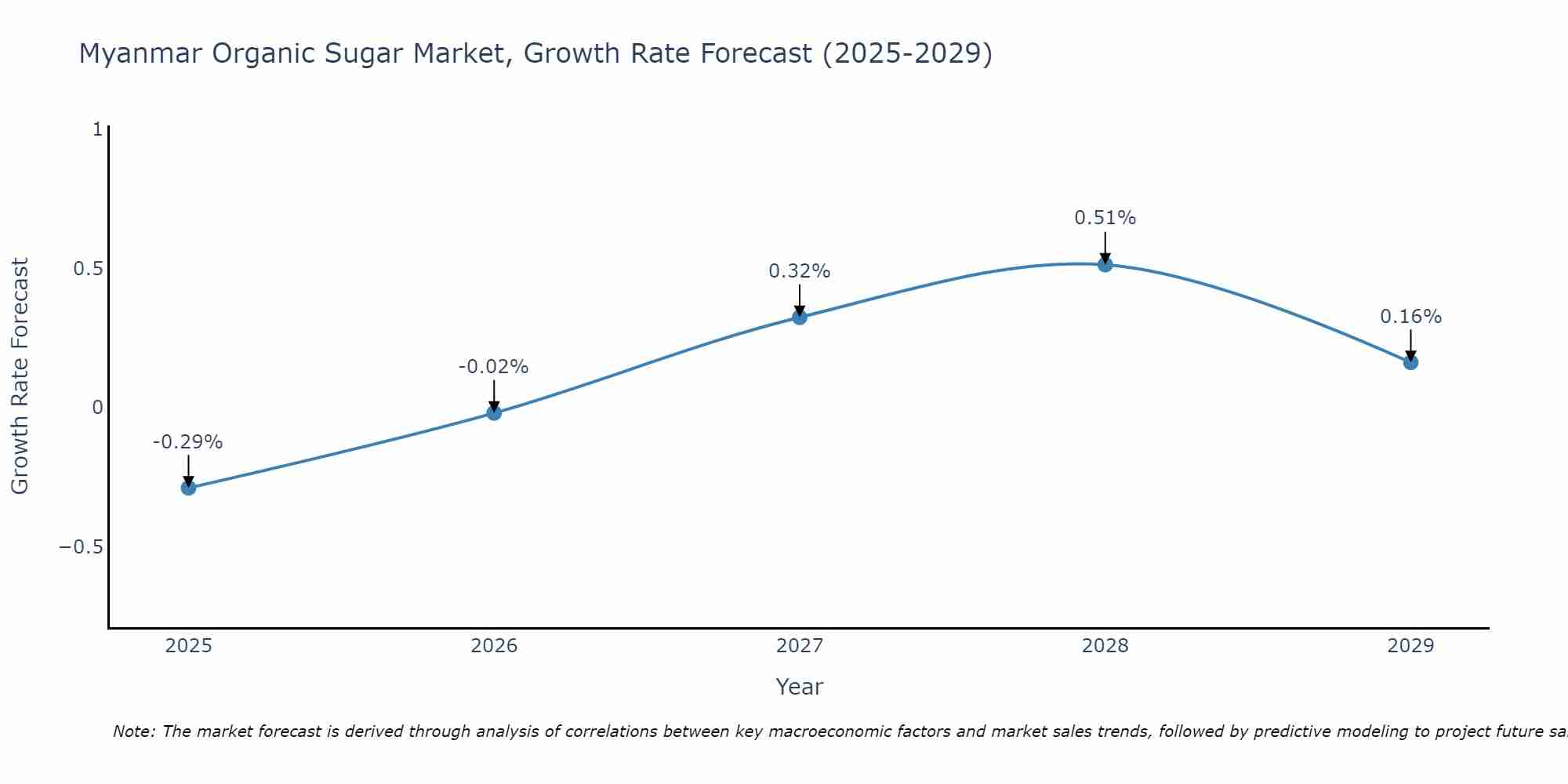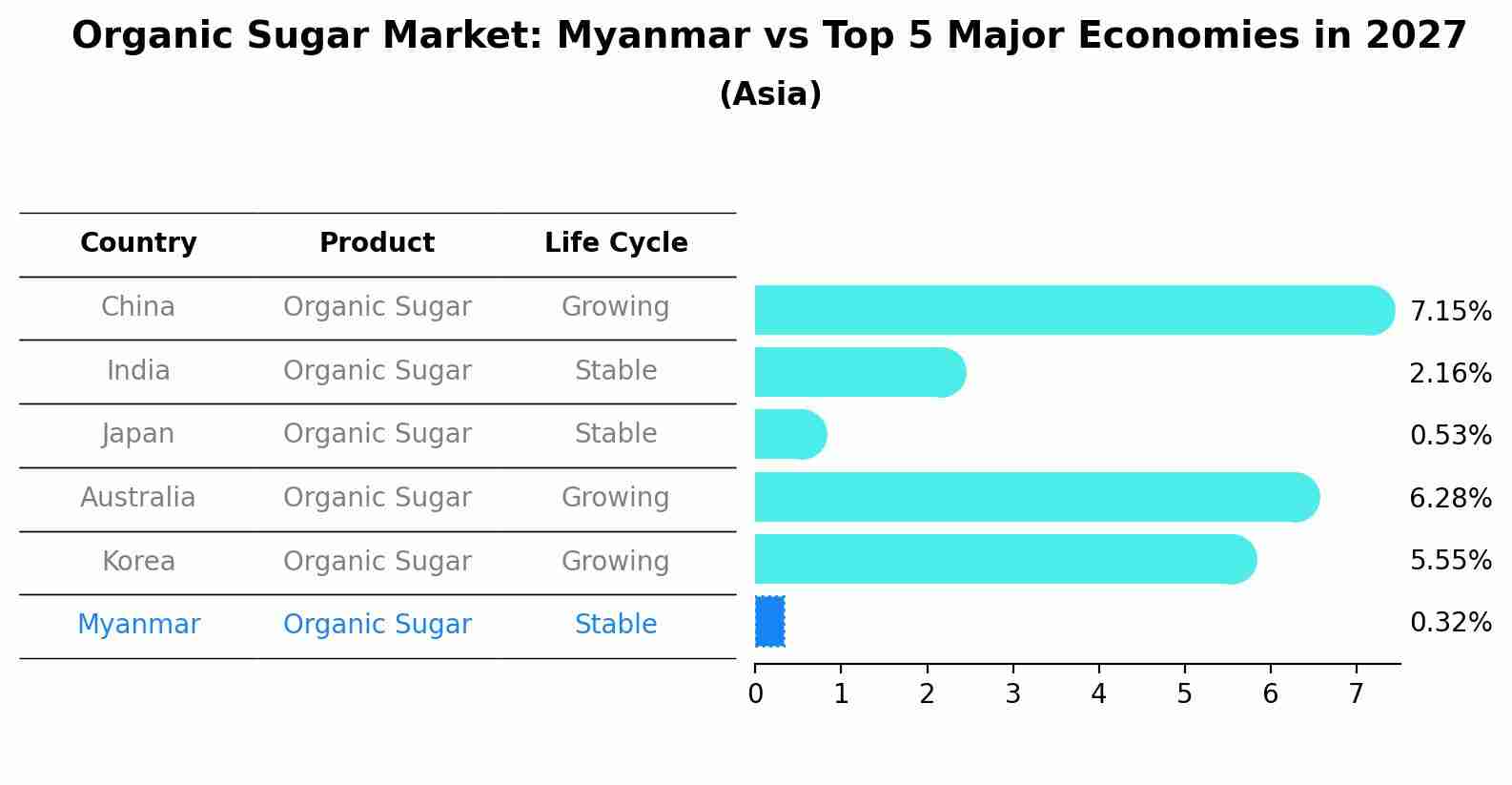Myanmar Organic Sugar Market Outlook | COVID-19 IMPACT, Analysis, Size, Forecast, Industry, Share, Value, Trends, Revenue, Growth & Companies
| Product Code: ETC109733 | Publication Date: Jun 2021 | Updated Date: Jun 2025 | Product Type: Report | |
| Publisher: 6Wresearch | Author: Shubham Padhi | No. of Pages: 70 | No. of Figures: 35 | No. of Tables: 5 |
Myanmar Organic Sugar Market Size Growth Rate
The Myanmar Organic Sugar Market is projected to witness mixed growth rate patterns during 2025 to 2029. Starting at -0.29% in 2025, the market peaks at 0.51% in 2028, and settles at 0.16% by 2029.

Organic Sugar Market: Myanmar vs Top 5 Major Economies in 2027 (Asia)
The Organic Sugar market in Myanmar is projected to grow at a stable growth rate of 0.32% by 2027, within the Asia region led by China, along with other countries like India, Japan, Australia and South Korea, collectively shaping a dynamic and evolving market environment driven by innovation and increasing adoption of emerging technologies.

Myanmar Organic Sugar Market Overview
The Myanmar organic sugar market is experiencing steady growth driven by increasing consumer awareness of the benefits of organic products. Demand for organic sugar is primarily being fueled by health-conscious consumers seeking alternatives to conventional sugar products. The country`s favorable climate conditions for sugar production provide a conducive environment for organic sugar cultivation. Key market players are focusing on expanding their product portfolios and distribution channels to meet the growing demand. Additionally, government initiatives to promote sustainable agriculture practices are further supporting the growth of the organic sugar market in Myanmar. Overall, the market is poised for continued growth as consumers prioritize health and sustainability in their purchasing decisions.
Myanmar Organic Sugar Market Trends
The Myanmar Organic Sugar Market is currently experiencing growth driven by increasing consumer awareness and demand for organic and sustainable products. Consumers are becoming more health-conscious and are seeking alternatives to conventional sugars. With a growing focus on environmental sustainability, there is a rising interest in organic farming practices among sugar producers in Myanmar. The market is also witnessing a shift towards organic sugar as an ingredient in various food and beverage products, further fueling market expansion. Key trends include the adoption of certifications such as USDA Organic and EU Organic, expansion of distribution channels to reach a wider consumer base, and investment in technology and infrastructure to enhance production efficiency while maintaining organic standards. Overall, the Myanmar Organic Sugar Market is poised for continued growth and innovation in response to evolving consumer preferences and market dynamics.
Myanmar Organic Sugar Market Challenges
In the Myanmar Organic Sugar Market, challenges primarily stem from factors such as limited awareness and understanding of organic products among consumers, lack of infrastructure for organic farming practices, inconsistent government regulations, and difficulties in obtaining organic certification. Additionally, competition from conventional sugar producers offering lower prices poses a challenge for organic sugar producers in Myanmar. Ensuring consistent quality and supply of organic sugar while maintaining competitive prices remains a major hurdle for market players. Moreover, access to markets and distribution channels for organic sugar products can be restricted, further hindering the growth of the sector. Overall, addressing these challenges through education, infrastructure development, policy support, and market expansion efforts will be crucial for the sustainable development of the Myanmar Organic Sugar Market.
Myanmar Organic Sugar Market Investment Opportunities
The organic sugar market in Myanmar presents attractive investment opportunities due to the increasing global demand for organic and natural sweeteners. As consumers become more health-conscious and environmentally aware, there is a growing preference for organic products, including sugar. Myanmar`s favorable climate and fertile soil make it well-suited for organic sugar production. Investing in organic sugar production in Myanmar can offer long-term growth potential and access to international markets seeking sustainable and ethically produced sweeteners. Furthermore, the government`s support for organic agriculture and the country`s relatively untapped market for organic sugar provide a conducive environment for investors looking to capitalize on the growing demand for organic products. However, it is essential for investors to conduct thorough market research, assess risks, and establish strong supply chain networks to succeed in the Myanmar organic sugar market.
Myanmar Organic Sugar Market Government Policy
The government of Myanmar has implemented various policies to support the organic sugar market in the country. These policies include providing financial incentives and support for farmers to transition to organic practices, promoting sustainable agriculture techniques, and offering training programs to enhance the skills of farmers. Additionally, the government has introduced certification programs to ensure the quality and authenticity of organic sugar products. These policies aim to boost the production and export of organic sugar, as well as to protect the environment and improve the livelihoods of farmers in Myanmar. Overall, the government`s initiatives demonstrate a commitment to developing the organic sugar market in a sustainable and responsible manner.
Myanmar Organic Sugar Market Future Outlook
The future outlook for the Myanmar Organic Sugar Market appears promising, driven by increasing consumer demand for natural and sustainable food products. With growing awareness about health and environmental concerns, there is a shift towards organic sugar as a healthier alternative to conventional sugar. The government`s support for organic agriculture and initiatives to promote sustainable farming practices further contribute to the market`s positive trajectory. Additionally, the rising trend of ethical consumerism and preference for transparent supply chains are likely to boost the demand for organic sugar in Myanmar. Overall, the market is expected to witness steady growth in the coming years, presenting opportunities for organic sugar producers to expand their market presence and cater to the evolving preferences of health-conscious consumers.
Key Highlights of the Report:
- Myanmar Organic Sugar Market Outlook
- Market Size of Myanmar Organic Sugar Market, 2021
- Forecast of Myanmar Organic Sugar Market, 2027
- Historical Data and Forecast of Myanmar Organic Sugar Revenues & Volume for the Period 2018 - 2027
- Myanmar Organic Sugar Market Trend Evolution
- Myanmar Organic Sugar Market Drivers and Challenges
- Myanmar Organic Sugar Price Trends
- Myanmar Organic Sugar Porter's Five Forces
- Myanmar Organic Sugar Industry Life Cycle
- Historical Data and Forecast of Myanmar Organic Sugar Market Revenues & Volume By Source for the Period 2018 - 2027
- Historical Data and Forecast of Myanmar Organic Sugar Market Revenues & Volume By Sugar Beet for the Period 2018 - 2027
- Historical Data and Forecast of Myanmar Organic Sugar Market Revenues & Volume By Sugar Cane for the Period 2018 - 2027
- Historical Data and Forecast of Myanmar Organic Sugar Market Revenues & Volume By Others for the Period 2018 - 2027
- Historical Data and Forecast of Myanmar Organic Sugar Market Revenues & Volume By Application for the Period 2018 - 2027
- Historical Data and Forecast of Myanmar Organic Sugar Market Revenues & Volume By Food and Beverage for the Period 2018 - 2027
- Historical Data and Forecast of Myanmar Organic Sugar Market Revenues & Volume By Pharmaceutical for the Period 2018 - 2027
- Historical Data and Forecast of Myanmar Organic Sugar Market Revenues & Volume By Others for the Period 2018 - 2027
- Historical Data and Forecast of Myanmar Organic Sugar Market Revenues & Volume By Type for the Period 2018 - 2027
- Historical Data and Forecast of Myanmar Organic Sugar Market Revenues & Volume By Crystal Sugar for the Period 2018 - 2027
- Historical Data and Forecast of Myanmar Organic Sugar Market Revenues & Volume By Gelling Sugar for the Period 2018 - 2027
- Historical Data and Forecast of Myanmar Organic Sugar Market Revenues & Volume By Liquid Sugar for the Period 2018 - 2027
- Historical Data and Forecast of Myanmar Organic Sugar Market Revenues & Volume By Icing Sugar for the Period 2018 - 2027
- Myanmar Organic Sugar Import Export Trade Statistics
- Market Opportunity Assessment By Source
- Market Opportunity Assessment By Application
- Market Opportunity Assessment By Type
- Myanmar Organic Sugar Top Companies Market Share
- Myanmar Organic Sugar Competitive Benchmarking By Technical and Operational Parameters
- Myanmar Organic Sugar Company Profiles
- Myanmar Organic Sugar Key Strategic Recommendations
Frequently Asked Questions About the Market Study (FAQs):
- Single User License$ 1,995
- Department License$ 2,400
- Site License$ 3,120
- Global License$ 3,795
Search
Thought Leadership and Analyst Meet
Our Clients
Related Reports
- Afghanistan Apparel Market (2026-2032) | Growth, Outlook, Industry, Segmentation, Forecast, Size, Companies, Trends, Value, Share, Analysis & Revenue
- Canada Oil and Gas Market (2026-2032) | Share, Segmentation, Value, Industry, Trends, Forecast, Analysis, Size & Revenue, Growth, Competitive Landscape, Outlook, Companies
- Germany Breakfast Food Market (2026-2032) | Industry, Share, Growth, Size, Companies, Value, Analysis, Revenue, Trends, Forecast & Outlook
- Australia Briquette Market (2025-2031) | Growth, Size, Revenue, Forecast, Analysis, Trends, Value, Share, Industry & Companies
- Vietnam System Integrator Market (2025-2031) | Size, Companies, Analysis, Industry, Value, Forecast, Growth, Trends, Revenue & Share
- ASEAN and Thailand Brain Health Supplements Market (2025-2031) | Strategy, Consumer Insights, Analysis, Investment Trends, Opportunities, Growth, Size, Share, Industry, Revenue, Segments, Value, Segmentation, Supply, Forecast, Restraints, Outlook, Competition, Drivers, Trends, Demand, Pricing Analysis, Competitive, Strategic Insights, Companies, Challenges
- ASEAN Bearings Market (2025-2031) | Strategy, Consumer Insights, Analysis, Investment Trends, Opportunities, Growth, Size, Share, Industry, Revenue, Segments, Value, Segmentation, Supply, Forecast, Restraints, Outlook, Competition, Drivers, Trends, Demand, Pricing Analysis, Competitive, Strategic Insights, Companies, Challenges
- Europe Flooring Market (2025-2031) | Outlook, Share, Industry, Trends, Forecast, Companies, Revenue, Size, Analysis, Growth & Value
- Saudi Arabia Manlift Market (2025-2031) | Outlook, Size, Growth, Trends, Companies, Industry, Revenue, Value, Share, Forecast & Analysis
- Uganda Excavator, Crane, and Wheel Loaders Market (2025-2031) | Strategy, Consumer Insights, Analysis, Investment Trends, Opportunities, Growth, Size, Share, Industry, Revenue, Segments, Value, Segmentation, Supply, Forecast, Restraints, Outlook, Competition, Drivers, Trends, Demand, Pricing Analysis, Competitive, Strategic Insights, Companies, Challenges
Industry Events and Analyst Meet
Whitepaper
- Middle East & Africa Commercial Security Market Click here to view more.
- Middle East & Africa Fire Safety Systems & Equipment Market Click here to view more.
- GCC Drone Market Click here to view more.
- Middle East Lighting Fixture Market Click here to view more.
- GCC Physical & Perimeter Security Market Click here to view more.
6WResearch In News
- Doha a strategic location for EV manufacturing hub: IPA Qatar
- Demand for luxury TVs surging in the GCC, says Samsung
- Empowering Growth: The Thriving Journey of Bangladesh’s Cable Industry
- Demand for luxury TVs surging in the GCC, says Samsung
- Video call with a traditional healer? Once unthinkable, it’s now common in South Africa
- Intelligent Buildings To Smooth GCC’s Path To Net Zero


















